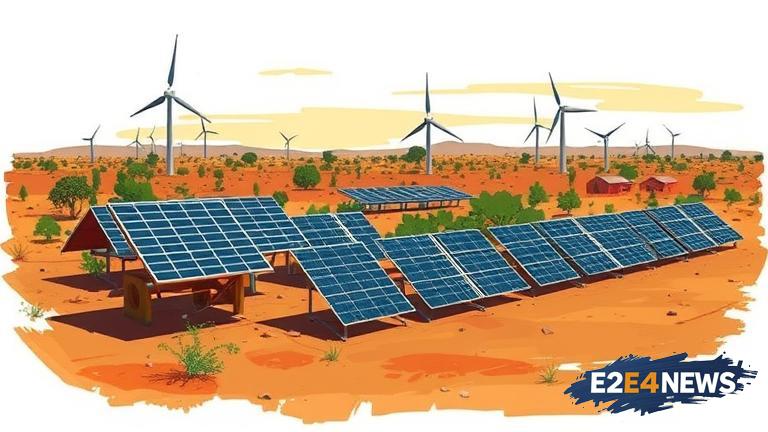The African continent is witnessing a significant shift towards renewable energy, driven by the need to address the pressing issues of energy access, climate change, and sustainable development. With a growing population and increasing economic activities, the demand for energy is on the rise, and renewable energy sources such as solar, wind, and hydroelectric power are becoming increasingly attractive. Many African countries are now investing heavily in renewable energy infrastructure, with a focus on solar and wind power. For instance, South Africa has set a target of generating 42% of its electricity from renewable sources by 2030, while Morocco aims to increase its renewable energy capacity to 52% by 2030. Egypt, on the other hand, has launched several large-scale solar and wind power projects, including the 1.8 GW Benban solar park, which is one of the largest in the world. Other countries, such as Kenya, Tanzania, and Ethiopia, are also making significant strides in the development of renewable energy. The growth of renewable energy in Africa is being driven by a combination of factors, including declining technology costs, improved energy storage systems, and increasing investment from international organizations and private sector companies. The African Development Bank, for example, has committed to investing $25 billion in renewable energy projects across the continent by 2025. The International Renewable Energy Agency (IRENA) has also launched several initiatives to support the development of renewable energy in Africa, including the Africa Renewable Energy Initiative, which aims to mobilize $20 billion in investment for renewable energy projects by 2020. Despite the progress being made, there are still several challenges that need to be addressed, including the lack of infrastructure, limited access to financing, and regulatory frameworks that are not always conducive to the development of renewable energy. However, with the right policies and investments in place, Africa has the potential to become a global leader in the transition to renewable energy. The benefits of renewable energy are numerous, including reduced greenhouse gas emissions, improved air quality, and enhanced energy security. Renewable energy can also create jobs, stimulate local economies, and improve the overall quality of life for communities. In addition, renewable energy can help to reduce the continent’s dependence on fossil fuels, which are a major contributor to climate change. The African Union has recognized the importance of renewable energy in achieving the continent’s sustainable development goals, and has launched several initiatives to support the development of renewable energy, including the African Renewable Energy Initiative. The private sector is also playing a critical role in the development of renewable energy in Africa, with several companies investing heavily in renewable energy projects. For example, the Norwegian company, Scatec Solar, has invested in several solar power projects in Africa, including the 400 MW Upington solar power plant in South Africa. Other companies, such as Vestas and Siemens Gamesa, are also active in the African renewable energy market, providing technology and services to support the development of wind and solar power projects. Overall, the future of renewable energy in Africa looks bright, with the continent poised to become a major player in the global transition to a low-carbon economy. With the right policies, investments, and technologies in place, Africa can unlock its vast renewable energy potential, reduce its dependence on fossil fuels, and achieve a sustainable and prosperous future for all. The growth of renewable energy in Africa is also expected to have a positive impact on the environment, by reducing greenhouse gas emissions and mitigating the impacts of climate change. Furthermore, renewable energy can help to improve energy access, particularly in rural areas, where many communities lack access to modern energy services. In conclusion, the renewable energy revolution in Africa is gaining momentum, driven by a combination of factors, including declining technology costs, improved energy storage systems, and increasing investment from international organizations and private sector companies. With the right policies and investments in place, Africa has the potential to become a global leader in the transition to renewable energy, and to achieve a sustainable and prosperous future for all.
